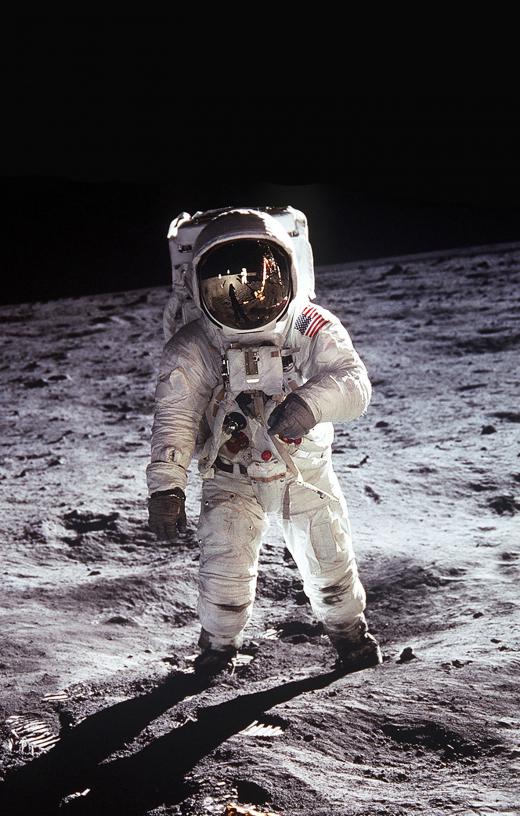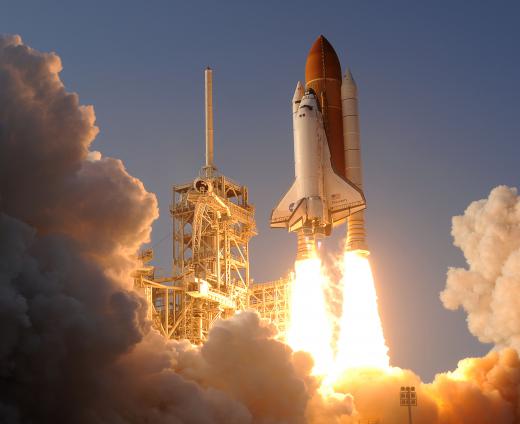What Was the Space Race?
 Michael Anissimov
Michael Anissimov
The Space Race was a long-lasting competition between the United States and the Soviet Union between the years of 1957 to 1975. It began with the delivery of the first artificial satellite, Sputnik, into orbit in October 1957. When exactly it ended is hard to pin down, but the first joint US-USSR mission in July 1975 is often cited. An alternative starting date is the launch of the first intercontinental ballistic missile, R-7 Semyorka, just six weeks before the launch of Sputnik.
Many historians consider the Space Race to be an extension of the Cold War. The USSR and US were competing to outdo each other in the mediagenic field of space exploration, in an effort to prove that their system of political organization (Communism vs. Capitalism) was superior. Although the Soviet Union had a very strong start, launching the first satellite and the first human into space, the US eventually triumphed in the long run, landing the first man on the Moon. By the mid-70s, the Soviet Union was entering an economic downturn that would signal its eventual collapse, and this forced it to cut way back on funding its space program.

The competition was intimately connected to military superiority as well as general technological superiority. The weapon of choice if the Cold War turned hot would be intercontinental ballistic missiles, suborbital launch units. Opposing countries would have an interest in disabling the spy satellites of the other side, but most of all, both countries wanted to show the world their general superiority.

When Sputnik launched on 4 October 1957, it put the Americans into a state of panic. It quickly became easy to get funding for space-related projects from the US government, and the National Aeronautics and Space Administration (NASA) was founded. In 1961, US President John Kennedy said that the United States should put a man on the Moon by the end of the decade. This was achieved in 1969, largely putting an end to the Space Race.
AS FEATURED ON:
AS FEATURED ON:


















Discussion Comments
This website is perfect for my whole family. My 7 year old son has a project to do and this website really helped, especially because I have no time to help since my 2 week old baby was born.
I think the space race was a really great step in American history. Like we're so good at winning.
@anon260361: Apollo 11 was the U.S. space mission that landed the first man on the moon on 20 July 1969. Astronauts Neil Armstrong and Edwin "Buzz" Aldrin Jr. piloted the lunar module to the moon's surface, while Michael Collins orbited the moon in the command module, Columbia.
It is from Neil Armstrong we get the quote, "That's one small step for man, one giant leap for mankind" as he stepped on the moon for the first time.
The lunar module's call sign was "Eagle" and so we get the familiar phrase, "The Eagle has landed."
What was Apollo 11?
What has space given to us? It gave us cell phones and GPS, it gave us an ability to plan our future. You think we should just "wait" for the time when earth is no longer inhabitable or overpopulated to start thinking of a way to get to space. We can't live on earth forever. The space race is a technological advancement for humankind, because we discovered the final frontier, which is space.
Space travel has become the topic of a lot of science fiction, but it tends to have little real application. Now that we have nobody to "race" with, I think the world should deal with its own problems before looking outward.
The Cold War was a time when conspiracy theories reigned supreme. Paranoia concerning Red intrusion and Communist infiltration of the free world caused people to do some radical things. Setting foot on the moon may seem to be a great new leap for mankind, but it could also be seen as merely a big waste of money and time. What has space really given to us?
@anon78935
That's a good question, some would argue that it was simply a waste of money on paranoia concerning a "space gap" or falling behind in terms of technology related to space travel and satellites. Probably the most important innovation had to do with understanding the worlds beyond us and the potential of satellite technology.
what were the achievements for the us and the soviet union?
Post your comments